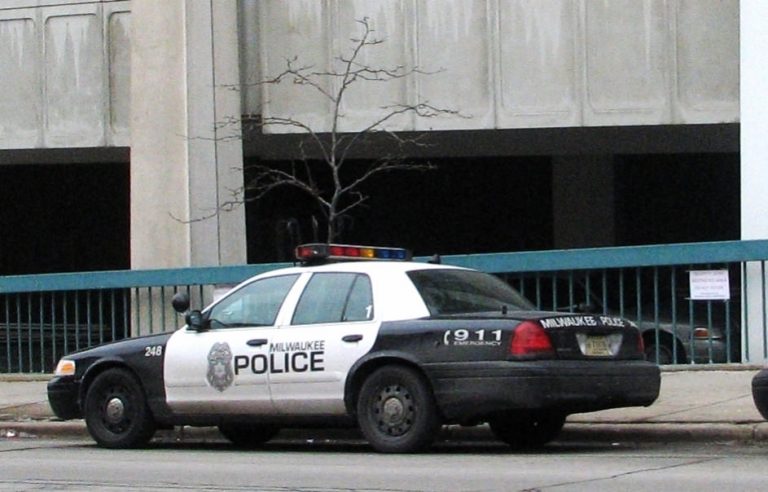Cops’ Training Shows Their Humanity
As outreach to community, Police Academy invites black pastors to observe training.

Squad cars are parked outside of the City of Milwaukee Police Administration building. (Photo by Brendan O’Brien).
The whole world is a stage, and everybody is playing a part, the stage is set, the curtain goes up, the scene is a broken heart. (Song by the Fantastic Four)
Peace Officers must have 24 hours of training yearly, and the Milwaukee Police Academy is the site for training officers from many jurisdictions. As a non-pastor member of Pastors United, I was invited to participate in the training sessions.
Citizen participation in the training scenarios is unprecedented. There are two scenes set up in the Police Academy theater in the basement. One scene involves a suspect walking in a gangway; another scene is a person sleeping in a legally parked vehicle.
Each performance is different. The young cadets use their street savvy and creatively to press officers to see each situation uniquely and to use their knowledge of the law, personal skills, personality and professional communication training to make their stops and defuse situations. Trainers may intervene in a scenario and ask for reasons why trainees acted in a particular manner at any point during an encounter with the suspect.
During the training scenarios, I have been taking notes in hopes that I might share my experience and insights. We have been participating for approximately three months, and this is what I have noticed so far:
- During Q and A at the end of each scenario, pastors would like to know how much experience an officer has on the force;
- Pastors are also curious about when and under what circumstances officers can stop, frisk, search, demand identification and arrest suspects;
- Trainers are most knowledgeable and generous with their time to explain the correct procedures according to their training manual, city ordinances, state statutes and Supreme Court decisions;
- Pastors seem to look for how things might go deadly wrong in a scenario;
- Pastors ask open-ended questions to officers about creating a better relationship with the community;
- Many officers share and vent when the opportunity arises;
- Many officers have mentioned they look forward to community meetings to discuss community/police relations and the need for cooperation;
- Second only to the need to be safe, cooperation seems to be most important for officers;
- Due to their concern for safety, officers have a keen sense of perception. They notice what is invisible to the average citizen;
- Officers have more power over life and liberty than anyone else on the planet. However, some officers express that they don’t like having that power;
- Some officers expressed that while in uniform, they feel like they have “targets on their backs”;
- Some African-American male officers expressed that when they take off their uniform, they still have a “target on their back”;
- Officers and pastors agree that there is a perception among many community members that the inner city is under constant surveillance by the police. There is also consensus that we all call the police when there is trouble and condone their presence for protection.
Last week, members of the media came to the training and taped one of the sessions. On the same day, one of the trainers prepared a “soul-food” feast for the participating pastors. It was a total surprise, and the meal was delicious. That gesture is consistent with the warm welcome we receive by peace officers and firefighters each day we show up at the academy.
Participating in the training has reinforced, for me, that peace officers are human beings, with various personalities, just like citizens. During the sessions, I looked upon hundreds of officers’ facial expressions and eyes. I attempted to discern body language that might reveal a rogue. There were a few who refused eye contact. A small number seemed to demonstrate an attitude via body language, which might have suggested an indifference to being at the training.
The roles we play affect our perceptions of reality. Perhaps, if we find ways to share and discuss our perceptions and realities, we might be able to agree on a better future. We must find or create a way to end the loss of life.
“All the world’s a stage,” wrote Shakespeare. Let’s write the script for peace and safety for all. We’ve had enough scenes of yellow tape and broken hearts.
Charles Robinson Sr., a mediator, college professor, former administrative law judge and member of Pastors United.
This story was originally published by Milwaukee Neighborhood News Service, where you can find other stories reporting on fifteen city neighborhoods in Milwaukee.
Op-Ed
-
Wisconsin Candidates Decry Money in Politics, Plan to Raise Tons of It
 Dec 15th, 2025 by Ruth Conniff
Dec 15th, 2025 by Ruth Conniff
-
Trump Left Contraceptives to Rot; Women Pay the Price
 Dec 8th, 2025 by Dr. Shefaali Sharma
Dec 8th, 2025 by Dr. Shefaali Sharma
-
Why the Common Council’s Amended Budget is Good Policy for Milwaukee
 Nov 20th, 2025 by Alds. Marina Dimitrijevic and Russell W. Stamper, II
Nov 20th, 2025 by Alds. Marina Dimitrijevic and Russell W. Stamper, II




















